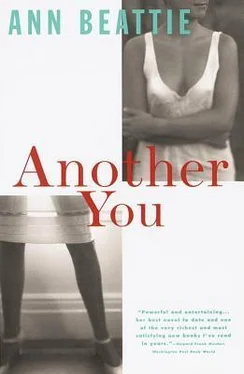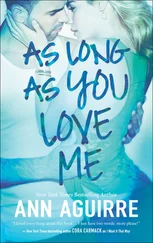Ann Beattie - Another You
Здесь есть возможность читать онлайн «Ann Beattie - Another You» весь текст электронной книги совершенно бесплатно (целиком полную версию без сокращений). В некоторых случаях можно слушать аудио, скачать через торрент в формате fb2 и присутствует краткое содержание. Год выпуска: 2014, Издательство: Vintage Books, Жанр: Современная проза, на английском языке. Описание произведения, (предисловие) а так же отзывы посетителей доступны на портале библиотеки ЛибКат.
- Название:Another You
- Автор:
- Издательство:Vintage Books
- Жанр:
- Год:2014
- ISBN:нет данных
- Рейтинг книги:5 / 5. Голосов: 1
-
Избранное:Добавить в избранное
- Отзывы:
-
Ваша оценка:
- 100
- 1
- 2
- 3
- 4
- 5
Another You: краткое содержание, описание и аннотация
Предлагаем к чтению аннотацию, описание, краткое содержание или предисловие (зависит от того, что написал сам автор книги «Another You»). Если вы не нашли необходимую информацию о книге — напишите в комментариях, мы постараемся отыскать её.
Another You — читать онлайн бесплатно полную книгу (весь текст) целиком
Ниже представлен текст книги, разбитый по страницам. Система сохранения места последней прочитанной страницы, позволяет с удобством читать онлайн бесплатно книгу «Another You», без необходимости каждый раз заново искать на чём Вы остановились. Поставьте закладку, и сможете в любой момент перейти на страницу, на которой закончили чтение.
Интервал:
Закладка:
Until we meet, Fondly ,
M .
5
IN A DISTURBING DREAM, the beagle that had run into the road when Cheryl Lanier had been in his car took flight just as he was about to hit it, his attempts to brake in time futile, the car like a heat-seeking missile targeting its object. Marshall was asleep and aware that he was dreaming, but someone or some situation had forced him to be asleep, so it was with the mixed emotions of a person unwittingly drugged, or perhaps hypnotized, somehow kept in a dreamlike state against his will — well: he couldn’t articulate it, but if he’d been forced to describe the way he felt, he could have said only that he felt slightly anesthetized and that while he knew the out-of-control car might cause serious harm, there was a simultaneous awareness that he could relax, because he was only a dreamer in a dream. Then his perspective shifted, and what he saw was a car in the snow, a car that might drive forever, a snowstorm that would continually fall, and beside him in the car was Cheryl. He had thought, within the dream: I’m dreaming , but then he had felt her hand in his and been sure that he was in real time, that whatever was happening was real. Somehow he and Cheryl had gotten out of the car, and they stood on an embankment, ankle-deep in snow, looking down on a miniature car running on its own, as if they were watching a slotcar someone else held the switch for. He felt momentarily pleased, in the dream, like a child taken to look inside a department store window at Christmas, seeing a train whizzing around a track, mounds of cotton sprinkled with glitter approximating fallen snow, small lights warming the interiors of each small cottage. Everyone was old-fashioned: the women in their wide-brimmed hats and floating scarves, hands plunged into furry muffs; the men in fedoras, holding aloft tiny children who were replicas of themselves. Everyone was waiting — as those at the store window waited — for Santa’s sleigh. He was clasping Cheryl’s hand in childish excitement as the teetering sleigh on its nearly invisible wires began its transit across the night sky, the sound of bells heralding its passage, Santa’s face seen in profile, until the sleigh with its shaky runners disappeared in a denouement of tinkling bells, while down below the automated figures, whose movements had not been well synchronized to correspond to the arrival of Santa’s sleigh, looked up just after he disappeared, their hats falling backward, the children held aloft to gaze upward at absolutely nothing.
None of which Marshall remembered until, standing with his bare feet on the cold bathroom tiles, he glanced out at the snowy morning, looking through the window to where one long icicle seemed to divide the glass in two. He crossed the floor to rub his pajama sleeve on the smudge of frost inside the window, peering up to see where the icicle originated, peering down to guess the depth of snow. He saw a dog sniffing near a bush. Seeing his car in the drive transformed to an R. Crumb mound, he remembered that not long ago he had been out in the snow, standing on a hill with Cheryl. No, he hadn’t; he had dreamed they stood together in the snow, but actually, the time they had been together, they had been inside his car, or in the tavern. They had not stood in the cold night air and observed any winter wonderland, any department store’s miniature animation of village life on a wintry night. He had heard about her roommate’s problems, she had flirted with him — to give her credit, what she had done was certainly a rather forthright, innovative version of flirting — and driving home he had thought again about the necessity of getting adequate counselling for Livan, about the surprising stupidity of so-called counsellors who should not have been able to keep their jobs if they could only question the victim about how abusive sex might affect her future. For a while he had successfully displaced his hostility toward McCallum onto the counsellor, whoever she was — that would be up to Sonja’s friend from the book discussion group to find out for him. But exactly which one was Jenny Oughton? Though Sonja had tried to describe Jenny, the women were not very differentiated in his mind: they were mostly women who had vaguely mannish haircuts, geometric earrings, and proper New England clothes, sitting in the living room shoeless, their socks individualizing them as pragmatic or mischievous. Though anyone could surprise you, those particular women, who were all about the same age, about the same height, either unnaturally thin or twenty pounds overweight, seemed, except for their feet, to hold no surprises. Sonja was the prettiest. She was also — from the few times he had overheard them discussing books — one of the most articulate. He was probably guilty of taking her for granted, though she never accused him of that. He saw from a note she’d left for him that she had gotten up early to visit Evie and then, hopefully, to show a house. Instead of writing the last word, she had drawn a rectangle and perched a triangle atop it: a house without doors or windows, the two geometric shapes meant to symbolize “house.” Maybe it was a form of superstition: if she didn’t say the word, if she didn’t refer to the house as what it was, maybe she would get the sale. Sonja was afraid of Friday the thirteenth and would not walk under a ladder. A ladder: he thought of the concluding lines of Yeats’s brilliant poem “The Circus Animals’ Desertion,” then of the imaginary ladders he’d leaned up against his childhood home to frighten his brother, Gordon, inventing scenarios to scare Gordon about burglars climbing shadowy steps in order to pounce on him in his sleep. Instead of Santa with his bag of toys, the intruder would carry a bag containing ropes to bind Gordon’s wrists, gags to snake through his mouth. Marshall’s vivid imagination had transformed every branch blowing in the wind into a footstep, while the tree shadows were squinted into precarious burglars’ ladders leaned against the house in windstorms. He had hated to let one imaginary scenario go to accommodate a revision, so that if whoever was imagined to be entering the house by ladder was not frightening enough in his own right, the intruder would hold a cage in which a wild coyote paced, a coyote that would be set free on Gordon’s face, where he would devour him by first eating his brain. Marshall had such a talent for storytelling that even though he was younger than Gordon, Gordon could be made to shriek muffled cries of terror into his pillow. And Marshall was so good at pretending, that if their father came into the room, he could feign sleep convincingly. His father never doubted it, while he’d hiss in Gordon’s ear that he was going to pull him out of bed and make him sit upright in the living room with all the lights on if his ridiculous night terrors didn’t end immediately. That was the punishment for too much carrying on at night: back in your clothes, out into the living room chair, and not the one with the footstool, either, hands in your lap, the overhead light burning. You could fall asleep if you were able to. If you stayed awake all night, well: that was your problem. Caused by you. Because of being ridiculous. So think about it.
He turned off the electric razor and placed it in the recharging stand toward the back of the counter. The image of a bound Livan cycled through his thoughts just as the memory of his cringing brother, hiding from burglars, faded. Having no image of Livan, in his mind he had made her look something like Cheryl Lanier: that height; those eyes, clear of makeup; the girl’s smooth, unlined face still settling into its final bone structure. When he’d returned home after being at the tavern with Cheryl, he had told Sonja he needed information from her friend at student health. In only the sketchiest way, not naming names, he had told her that some faculty member had apparently mistreated a student, and that the student’s visit to a psychologist at student health had only compounded the problem; what was the name of the woman in her book discussion group who worked at student health? He did not want the poor student to blunder into an inadequate counsellor a second time.
Читать дальшеИнтервал:
Закладка:
Похожие книги на «Another You»
Представляем Вашему вниманию похожие книги на «Another You» списком для выбора. Мы отобрали схожую по названию и смыслу литературу в надежде предоставить читателям больше вариантов отыскать новые, интересные, ещё непрочитанные произведения.
Обсуждение, отзывы о книге «Another You» и просто собственные мнения читателей. Оставьте ваши комментарии, напишите, что Вы думаете о произведении, его смысле или главных героях. Укажите что конкретно понравилось, а что нет, и почему Вы так считаете.












